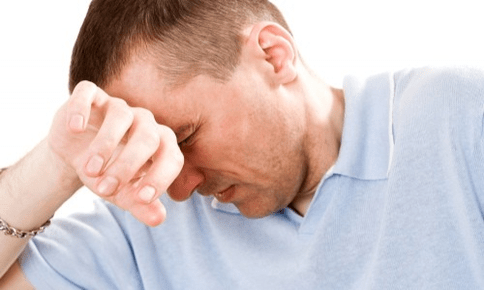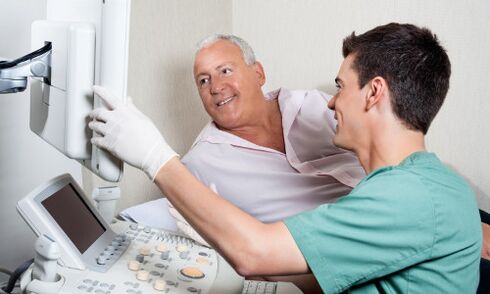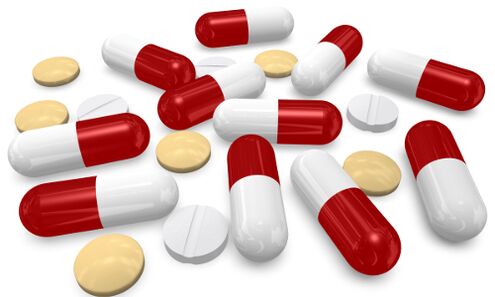Nowadays, the treatment of prostatitis is a big problem for doctors around the world, because the disease is complex and insidious.

Prostatitis can affect only the stronger sex, although some do not even know until a certain point which doctor treats prostatitis.
Regardless of age, if a man is worried about discomfort or if there are any similar signs, you should immediately contact a specialist.When contacting a medical institution on time, the treatment of prostatitis in men will not cause any difficulties.
Types of prostatitis and its signs
Based on the area of disease affection, prostatitis can be divided into 2 main types:
- Infection in the prostate in men, which guarantees the course of the disease mainly in the pelvic area.
- Congestive prostatitis, which directly affects the prostate gland.
The forms of the course of the disease can be of 3 types:
- chronic bacterial (treated with physiotherapy and symptomatic therapy);
- chronic abacterial (prostatitis is treated depending on the reasons that caused it);
- exacerbation of a chronic form (treated with antibiotics).
The following factors can be considered signs of the development of prostate disease in men:
- violation of the process of urination;
- sexual dysfunction;
- sharp pains in the lower abdomen, in the scrotum;
- discomfort in the perineum;
- change in the amount of ejaculate.
Almost all types of the disease occur mainly without clinical symptoms, but in a situation with chronic prostatitis, a long course of the disease is observed. Treatment of prostatitis should be prescribed only by a professional practicing urologist based on the results of the tests passed.
All the nuances associated with acute clinical symptoms can be based on various factors, such as:
- how long a neglected disease lasts;
- the level of the inflammatory process;
- are there any pathologies in this area;
- regularity of sexual activity.

Such questions are important because the signs of the development of the disease are quite similar to the onset of other diseases in this area.
Causes and risk factors
There are several main reasons for the development of such a disease:
- a sedentary lifestyle, mainly for managers and civil servants, some officials;
- dysfunction of the circulatory system;
- low immunity;
- constant stress and systematic psychological stress;
- frequent, severe hypothermia, especially for downhill skiing and similar sports;
- prolonged lack of sexual activity;
- various infections that are sexually transmitted (mycoplasmosis, herpes, chlamydia, fungus, Trichomonas, Escherichia coli);
- violation of the hormonal background of the body;
- deficiency of vitamins and minerals.

Symptoms of prostatitis
Most often, the disease proceeds with pronounced symptoms, so it will not be so difficult to notice it in time. The symptoms of the disease are as follows:
- violation of potency;
- pain in the perineum;
- discomfort in the anal area;
- frequent urination accompanied by pain;
- temperature increase;
- an increase in the level of sweating.
In no case should you delay the treatment of the prostate in men, since in addition to various painful sensations, prostatitis also reduces the level of blood circulation in the genitals, which impairs the ability of sperm to mature.
If a man shows one of the above symptoms, this may be due to either individual characteristics or the development of other diseases. Often, when prostate inflammation occurs in men, the symptoms manifest themselves and aggravate each other.

In the case of chronic diseases of the prostate gland, the symptoms are the same, but in a less expressive form. But the danger of the disease spilling over into a chronic form is that in moments of crisis, the condition will deteriorate sharply. In addition to the main symptoms, the following may be added:
- a constant feeling of a full bladder;
- discharge from the urethra during bowel movements;
- severe irritability;
- lack of orgasm.
The lack of timely proper treatment results in the development of such complications:
- recurrent cystitis;
- suppuration of the prostate (can only be corrected by surgery);
- obstruction of the bladder;
- the development of infertility;
- narrowing of the urogenital canal;
- impaired renal function;
- sepsis and complications that threaten life and health;
- development of renal failure.

Prostatitis, which has not been treated, can lead to the following complications:
- development of vesiculitis or inflammation in one or two seminal vesicles at once;
- inflammation of the seminal tubercle;
- the formation of stones in the prostate gland.
One of the most unpleasant complications is prostate sclerosis, i. e. the disease has been developing for a long time and acquires some degree of complexity, but the symptoms by which it can be identified appear much later. Thus, it cannot be determined without a special medical examination.
Some advanced forms of the disease can lead to a complete lack of sex drive. Namely, to a deterioration in the work of receptors responsible for sex life and sexual arousal, a decrease in the level of hormones.
Modern diagnostics and treatment
Such a problem cannot be solved on its own, therefore, if any noticeable symptoms are found, it is worth contacting a urologist as soon as possible.
Drugs for treatment are different and are selected in accordance with the individual physiological characteristics of the patient.
Treatment of prostatitis should not be carried out on your own, at home.
Modern treatment and diagnostic methods almost accurately determine the disease and the degree of its development.
Often, the first thing a urologist prescribes for the treatment of prostatitis is urine analysis by means of various samples, bacteriological examination of urine and secretions of the prostate gland, which will provide an accurate picture of the localization of urinary tract infection.

In addition, it is very important to undergo a test digital examination of the prostate gland, which cannot be called particularly pleasant for a man, but for determining the disease it is quite informative in nature. In some unclear cases, the urologist may direct the patient to study the enzymes of the prostate gland, ultrasound examination of it and the pelvic organs, as well as computed or magnetic-nuclear tomography, cystoscopy and urography. All of the above tests will correctly determine the treatment of prostatitis.
At the time of diagnosis by a specialist, he must completely exclude the possibility of developing benign prostatic hyperplasia or prostate cancer in the human body.
In order to temporarily relieve pain, you need to know how and how to treat the disease. Preparations of the group of analgesics, as well as warm baths, will be very effective for the treatment of prostatitis.
Many are wondering today how to treat prostatitis in men. If a urologist diagnosed a man with bacterial prostatitis, antibiotics will be prescribed without fail, which are selected on an individual, specific case by means of bacteriological inoculation of secretions on nutrient media and determining the sensitivity of the pathogen to chemotherapy drugs.
For the treatment of non-bacterial prostatitis, only anti-inflammatory drugs are prescribed.
The process of treatment itself and its duration, effectiveness directly depend on the treatment of prostatitis, which is correctly chosen by the doctor, and on the timely appeal to a medical institution.
The prescribed treatment must be carried out responsibly and in full, otherwise there will be no expected effect. The treatment process should be complex, most often the following measures and drugs are prescribed:
- Massage procedures of the prostate gland.
- Physiotherapy procedures.
- Improvement and correction of the immune system.
- Various antibacterial drugs.

But in any case, at the very beginning, a pronounced inflammatory process is removed by antibiotics. The most common are fluoroquinolones and many others, which belong to the group of agents that penetrate into prostate tissue.
In addition, in some rare cases, penicillins or macrolide drugs may be prescribed to treat prostatitis.
In order to reduce pain, patients are prescribed non-steroidal anti-inflammatory drugs.
In the course of the diagnostics and analyzes carried out, infectious diseases of the genital canal can be detected. In order to cure them, targeted therapeutic measures are required.
If only antibacterial treatment of prostatitis is carried out, ignoring the complex of other measures, the pathogen will not disappear, the symptoms will simply go away, and the disease can continue to proceed in a latent form.
No matter how meaningless it may seem, but the main influence on the treatment of prostatitis have massage procedures of the prostate, although they are so intolerant for a man.
Massage significantly improves the level of blood circulation, which allows you to get rid of suppuration and speed up the healing process. Also, massage allows the active substances of the drugs to better penetrate the tissues of the prostate.
Almost all prescribed therapeutic procedures are aimed at improving blood circulation in the prostate area:
- Warm herbal baths.
- Magnetotherapy.
- Electrophoresis.
And, of course, immunocorrective therapy is prescribed in the form of fortifying drugs and special vitamin complexes. Almost always, experts recommend dietary nutrition and lifestyle changes: it is precisely the rejection of bad habits and strict adherence to the diet that will largely help improve the patient's condition and, most importantly, overcome a disease such as prostatitis.

If you wish, you can pay attention to the methods of alternative medicine, which has a large number of recipes on how to cope with prostatitis. Prostatitis, which will be treated at home, may not be fully cured.
In order to relieve pain and relieve some of the symptoms, decoctions, candles and tinctures of medicinal herbs are used. But even in this case, it is recommended to first consult with a urologist.
Actually, in order to protect himself, a man should not carry out any preventive measures, he should only take a responsible and careful approach to his lifestyle and health.
According to the advice and recommendations of specialists, not much is needed for this:
- Regular sex life, which ensures ejaculation, as prevention of prostatitis.
- It is optimal to have a constant partner and in every possible way to avoid promiscuous sex, which only stimulates the development of such diseases.
- In case of possible casual sex, be sure to use protective equipment.
- Constant small physical activity is good for prevention, especially for those whose profession is associated with a sedentary lifestyle.
- Try to avoid hypothermia.
- Timely treatment of prostatitis and urogenital infections.
- Refusal from bad habits and wrong lifestyle.
- A healthy diet and normal sleep patterns.
- Systematic visits to the urologist.
Prevention will allow a man to protect himself from such an insidious and unpleasant disease as prostatitis.
A little conclusion
Remember that, despite the rather long time period of treatment of prostatitis, a positive result is quite achievable and you just need to strive for your goal. Be healthy!






























